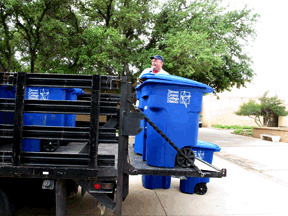By Joshua Knopp/managing editor
TCC’s Going Green program has come a long way in three years.
What started as a student-operated recycling project has become a districtwide initiative to reduce the five campus’ carbon footprint.
Lori Fowler, currently a sociology professor on TR Campus, was on NE Campus at the time and sponsored the student group that began it all.

Joshua Knopp/The Collegian
“Over the years, my students threw trash away in the classroom, and there was never a recycle bin,” Fowler reminisced. “I decided as a class project, we would start a recycling campaign.”
The class started out simply by distributing containers to people.
“Every Friday, we would get together and go to a new campus. We would hand out these recycling bins to everyone we could find,” Fowler said. “We literally piled into cars and drove to different district offices and handed people recycle bins. Some of them would say, ‘I don’t need this,’ and we said, ‘Yes, you do.’”
The class also made art out of recyclable products and auctioned the pieces at a dinner, where $1,200 was raised for Alliance for Children.
The project became a giant, and eventually Fowler reached out to the maintenance departments in a districtwide push for recycling. Coordinators were brought in to speak about the benefits of recycling and ways in which it could be cost-effective.
“[Facilities manager Mike Tankersley] on NE started looking at the data and proved that it would save a lot of money to save the paper,” Fowler said.
“Recycling is not profitable,” Tankersley stated bluntly. “But there’s cost savings.”
Tankersley described the process by which trash and recycling are taken off of TCC’s campuses. The college uses a single-stream recycling system, which is a system in which aluminum, glass, plastic and paper all go in the same bin and are sorted out at a separate location. The plant makes its money by selling the refreshed material to production companies, which in turn use them in their products.
TCC doesn’t pay for the recycling to be picked up. It is actually paid by the recycling company for their trouble based on the tons of recycled goods the college contributes.
Trash, on the other hand, is compacted into eight-ton cubes which are hauled off to a landfill — for $500 a cart.
At first glance, the money doesn’t appear to be saved because it’s not something that is being bought and spent less on. Rather, it’s something that’s just not being bought as much. Tankersley applies this logic to all forms of conservation.
“Every time you conserve water, you save money,” he said. “Every time you use high efficiency and save electricity, you save money.”
So what exactly is TCC doing to go green?
Aside from recycling and aiming for Leadership in Energy and Environmental Design, or LEED, approval in new buildings, TCC has made a concerted effort to use organic and environment-friendly materials for its groundskeeping and custodial work. NE lead groundskeeper John Tilley said his department hasn’t changed much since Going Green started because it already used mostly organic materials.
“The fertilizer we use is organic, always has been,” Tilley said. “The equipment we used already met the standards in terms of emissions. We were using very little pesticides, just spraying along the sidewalks. The only thing to decide was what to use [on weeds that grow] in parking lots, and we’re still working on that.”
Tilley said that the groundskeepers used only non-organics heavily when they had a severe infestation, such as one with aphids last spring. Instead of pesticides, though, the groundskeepers used fatty acids to fight off the insects to surprising effect. Tilley said he was also surprised by the potency of dry molasses to fight off ants.
The main problem the department had being environmentally friendly was the cost, he said.
“Right now, it’s very expensive,” he said. “There’s not a whole lot out there right now, but because it’s so popular, there’s a lot that’s coming out pretty soon. Hopefully, that’ll make it a lot more cost-effective.”
South’s lead custodian Kenneth Mays said he underwent a material change, but that was it.
“We went to the green products and chemicals that we use,” Mays said. “Everything that we use now is safe, and we have a material safety data sheet on every product that we use.”
Mays had more changes over the past three years because of the increase in student population than he has from Going Green.
TCC can look north to the University of North Texas for an example of what else can be done to reduce negative environmental impact. The four-year university has worked at efficiency for a decade and has reduced its carbon output by 55 million pounds per year, says UNT news promotion manager Buddy Price.
Along with recycling, requiring new buildings be up to LEED standards and switching campus vehicles from gas to electric, UNT upgraded its lamps, thermostats, boilers and chillers with greener models. Also, the school has its own biodiesel generator to convert cooking oil into diesel fuel.
Tilley said that, moving forward, Going Green was just a matter of staying the course.
“For me, I think it’s going to be low-impact,” Tilley said. “The equipment we were using was already the right equipment. The procedures were already right. In the future, this is just going to get better as the demand increases. And, hopefully, the price will go down.”
Tankersley believes that it is the college’s responsibility to go green.
“When you’re in a college, you’re sort of leading the world,” Tankersley said. “It’s the right thing to do.”

























